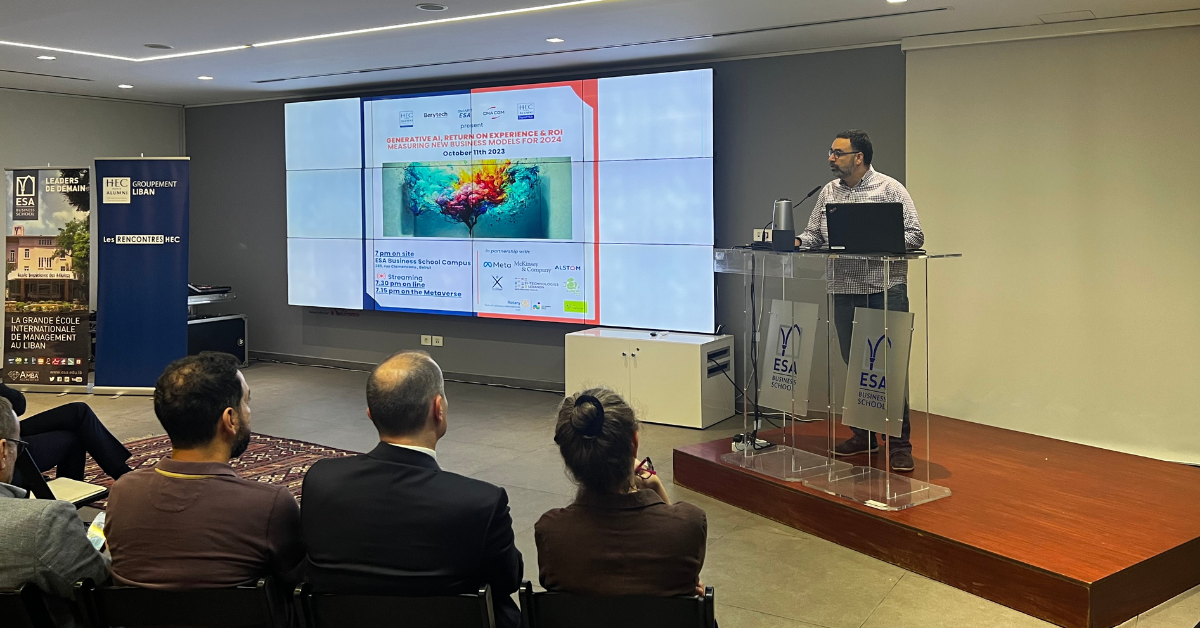In response to the surging interest in AI technology, which has taken a prominent place on the CEO’s agenda, companies are leaning forward to integrate AI into their everyday operations. Recognizing this evolving landscape, the HEC Alumni Digital Hub in Paris in collaboration with CMA CGM, Berytech, and SmartESA hosts a significant conference. This event revolved around the practical application of AI and the tangible returns it can yield.

The conference boasted a diverse lineup of speakers hailing from various industries and distinguished companies. Among them were representatives from McKinsey, Meta, Alstom, Aive (notable for its video editing expertise), and EI Technologies, a tech firm specializing in Salesforce solutions.
The purpose of hosting this event in Lebanon is to highlight the global advancements in artificial intelligence (AI) and the opportunities it can offer the Lebanese tech ecosystem. Being the second of a series of hybrid conferences organized by HEC Alumni Lebanon, HEC Alumni Digital Hub Paris, Berytech, Smart ESA, and CMA CGM; The event also aims to foster connections between local organizations, such as the event organizers, and startups contributing to innovative solutions within Lebanon’s tech and AI sectors.
This article aims to share the insights and experiences gained during the conference so that readers can tap into the promising potential offered by AI. AI is not merely a passing trend; it’s becoming a foundational pillar for business operations.
McKinsey: towards the next productivity frontier with Gen AI
The impact of generative AI can be viewed from different lenses, such as value creation or accelerated time lens. Starting from the value creation perspective, we can see that Generative AI’s impact on productivity is not minimal. According to McKinsey Quarterly report, it can add between 2.6 and 4.4 trillion USD annually on value creation across the 63 used cases analyzed. To put things into perspective, France’s GDP will be 2.958 trillion USD in 2021 according to the World Bank. The impact of generative AI will be across all industry sectors, but 75% of the value that it could deliver falls across four areas:
- Customer operations
- Marketing and Sales
- Software Engineering
- Research and development
Additionally, from a time perspective, we can see that the pace of workforce transformation is likely to accelerate, so half of today’s work activities can be automated in 10+ years, roughly a decade earlier than what was estimated previously by the firm.

Alstom: a real business value and effective ROI with Gen AI
Alstom, the leader in train manufacturing and operations, used AI for simulation purposes, so it could optimize the design and operations of their trains. Based on Alstom Experience, we can identify key learnings and success factors in the use of AI in Business that can be summarized as follows:
• Poor requirements are a main degradation factor in the success of IT project transformation. Generative AI can play a significant role in clarifying the requirements of the clients to avoid wasting man-days.
• Drive a “think big and act small” strategy to deliver real business value and maximize
profitability.
• Creating a target operating model with vertical organization as a common place for double hat champions in AI and Business is a necessity.
• Develop and maintain an in-house skill set on AI, data, and emerging technologies.
• Mobilize AI champions on operational programs and projects at an early stage.
Meta and AI: From Research to the End Product
Meta’s journey with AI began in 2006 when it introduced an AI-powered Newsfeed, initially under Facebook’s umbrella. The torch was passed to Yan LeCun, Chief AI Scientist, who co-launched fundamental AI research in 2013. Today, Meta continues its AI endeavors, boasting the powerful large language model LLaMA, launched this year.
Meta’s AI investments are diversified, focusing on:
• Strengthening the discovery engine, exemplified by enhanced Facebook and Instagram recommendations.
• Detecting and mitigating harmful content.
• Automating meaningful chat interactions and chatbot-driven messaging.
• Advancing the development of dynamic and interactive 3D environments.
Meta’s upcoming release, Meta AI, will serve as a personal assistant across all Meta apps, including WhatsApp and Instagram Direct. This AI will be continuously trained on up-to-date data to boost end users’ productivity.
Additionally, Meta is introducing 28 AI personalities, spanning sports and music enthusiasts like Tom Brady and Snoop Dogg.
The graphic below encapsulates AI’s impact on various aspects of business improvement, whether it will be data and measurements or creativity and marketing.

Aive and EI technologies exposure to AI
Generative AI is making significant inroads in CRM, with Salesforce launching Einstein GPT and a suite of GPT-powered applications, including Sales GPT, Service GPT, Commerce GPT, Slack GPT, and AI Cloud.
These introductions signify a transformation in the CRM landscape as AI takes center stage.
Furthermore, Aive leverages AI to simplify and speed up video editing, offering designers a broader array of choices while channeling their creative energy toward crafting cutting-edge videos.
The event concluded with Game Cooks, a game studio based in San Francisco and Beirut, a workshop demonstrating immersive VR headset experiences, as shown in the accompanying image.

In summary, the era of generative AI is poised to revolutionize industries, offering substantial returns on investment. However, investors and CEOs must balance the potential rewards with inherent risks, prioritizing ethics, data privacy, and regulation. While the full benefits may take time to materialize, history shows that technological advances often exceed expectations. By investing wisely in understanding, harnessing, and responsibly deploying generative AI, we can usher in a transformative era sooner than anticipated.










